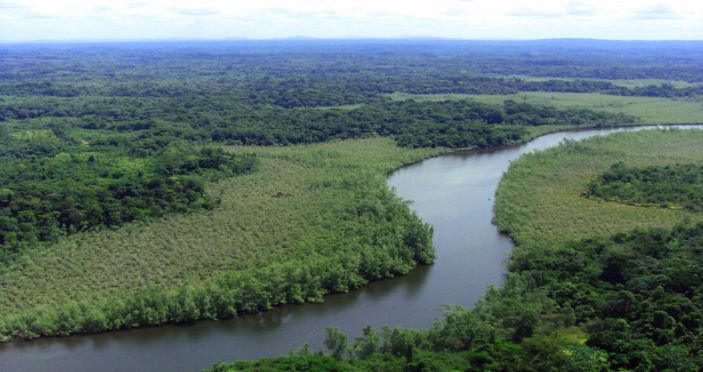PHOTO: Forest with River (credit: Liberia’s Environmental Protection Agency)
By Urban Sjöström, Sweden’s Ambassador in Liberia and Stephen Rodriques, UNDP Liberia’s Resident Representative
“The forest and the Kpatawee Waterfall have been here decades before we were born and we have been farming, hunting and collecting wood from this forest all these years. Now that the Government has declared this area protected and prevented us from accessing this area, how do we survive as a community?” lamented an elder man from the Kpatawee community in Liberia’s Bong County, during the Ecotourism Dialogues held as part of activities in observance of the World Wetlands Day on February 2, 2021.
The question highlights the ever-present tension between protecting key conservation areas like the Kpatawee Ramsar Site – a wetland of international importance – and securing the livelihoods of communities that depend on these areas.
Liberia is recognized as one of the world’s biodiversity hotspots. The country hosts the highest remaining portion, more than 40%, of the Upper Guinean Forest, which is rich in plants, animals and other creatures that are unique to Liberia. Scientific studies in Liberia’s forests continue to unveil species new to science. The National Forest Inventory of 2018-2019 estimates that Liberia has 6.6 million hectares of forest, covering about 69% of the total land area. The country has an ambition of protecting 30% of its forests and the rich biodiversity found therein. The country currently has five protected areas, one wetland and four forests, with seven more designated for protection.
These natural resources are not only important for the people of Liberia, but they are also important for a global community that is grappling with climate change and a planet that is getting warmer every year. And let us be clear on this: climate change is not only affecting countries like Liberia – look for example, at the sea level rise and coastal erosion in places like West Point and New Kru Town – it is a threat to our entire planet and to every human being that lives on it.
But, despite their global and national significance, and notwithstanding several ongoing conservation initiatives in the country, Liberia’s natural resources are under threat from human activities such as deforestation for charcoal production, commercial logging, small-scale chain saw operations, mining and encroachment of wetlands by farming and construction activities. Almost half of the people of Liberia live within 2.5 kilometers of a forest and many rely on forest products for income generation and livelihoods. As the human population grows, and as the demand for food and energy increases, we will only see more pressures on the country’s forests and wetlands.
Left unchecked, the country’s natural defense systems against climate change and associated changes in weather patterns could be destroyed. Forests, regarded as the Earth’s lungs, are important for air purification as they absorb and store carbon dioxide, which is one of the pollutants driving global warming. Likewise, when we drain wetlands, whether for farming, building or other commercial purposes, we are destroying water purification and storage systems that guarantee clean water supply to present and future generations.
The simple message here is: our actions have consequences. When we destroy our natural resources, we threaten our own survival as a human species. Coastal erosion, more severe droughts and storms are the early warning signs that our climate is changing. We must act now.
But history also teaches us that when we act, we must act in the interest of People, Prosperity and Planet. This means we should seek to conserve our biodiversity and protect the environment without compromising the livelihoods of the people who depend on forests and wetlands.
This is why UNDP and the Embassy of Sweden are working with the Government of Liberia and other partners to ensure that forest and wetland protection are done in ways that are inclusive and that we involve local communities in co-managing forests and wetlands. Our aim is to also ensure that communities can derive economic benefits through sustainable alternative livelihood options such as promotion of non-forest enterprises, harvesting of non-timber forest products, climate-smart farming, agroforestry and ecotourism. This will improve the living conditions of the people and provide economic incentives for community-driven forest and wetland conservation in Liberia.
We strongly believe that without sustainable and inclusive management of forests, wetlands and their biodiversity, people who rely on these ecosystems are at risk of not
only losing their only source of livelihood and food security, but are also at risk of sinking deeper into poverty.
This year marks 50 years since the world first made the connection between the management of the environment and poverty at a meeting held in Stockholm, Sweden. The last five decades have clearly demonstrated that environmental conservation and poverty eradication are inextricably linked; poverty eradication, growth, prosperity and development cannot be attained without safeguarding nature.
As the world prepares to convene again in Stockholm this June, it is an opportunity to reflect on lessons of the past 50 years and to see how these lessons can guide us as we face the extraordinary triple crises of today – the climate emergency, the unprecedented socio-economic impacts of COVID-19, and continued degradation of ecosystems and biodiversity. Over the coming weeks there will be national and local dialogues with all groups of stakeholders across Liberia to get their views on how best we can protect people, promote prosperity, and defend our planet.
A healthy planet is necessary for the prosperity of all peoples and nations, and it is our shared responsibility.

